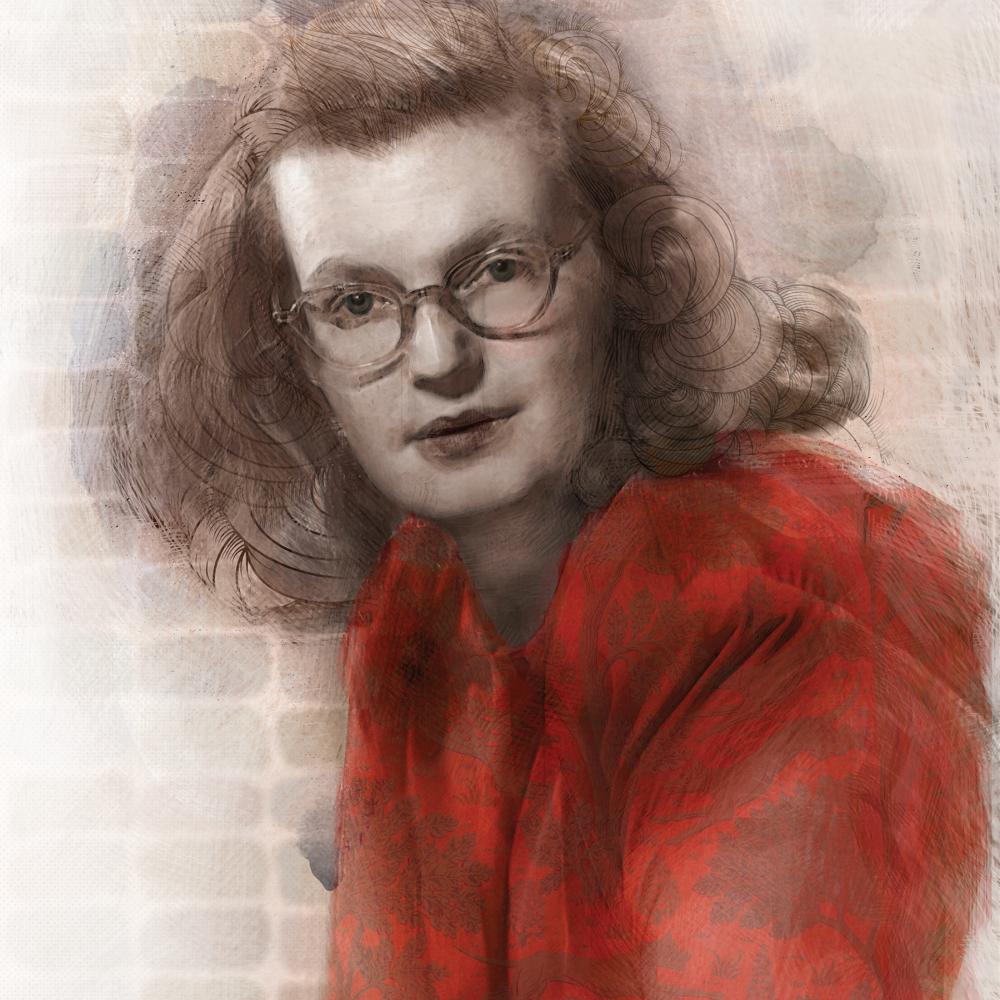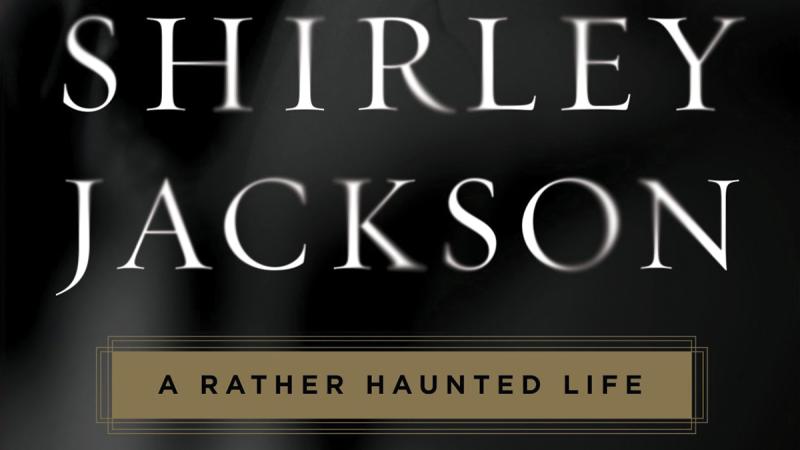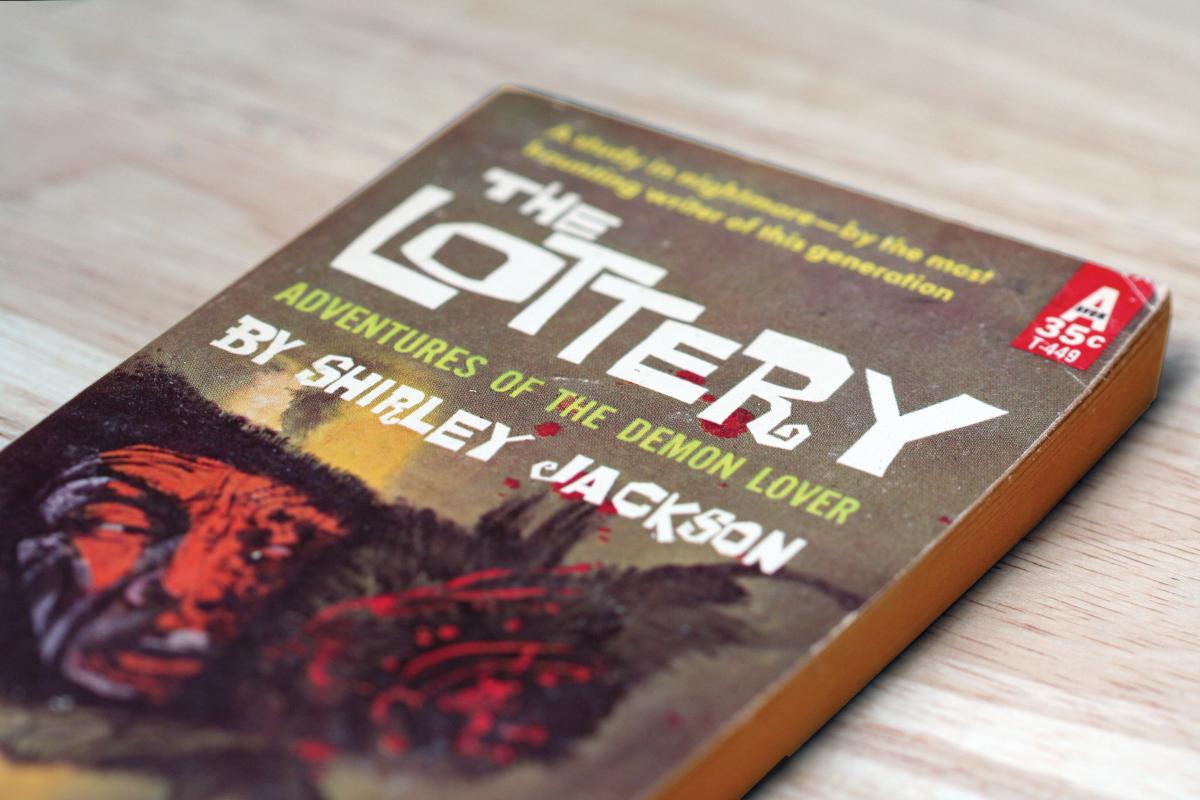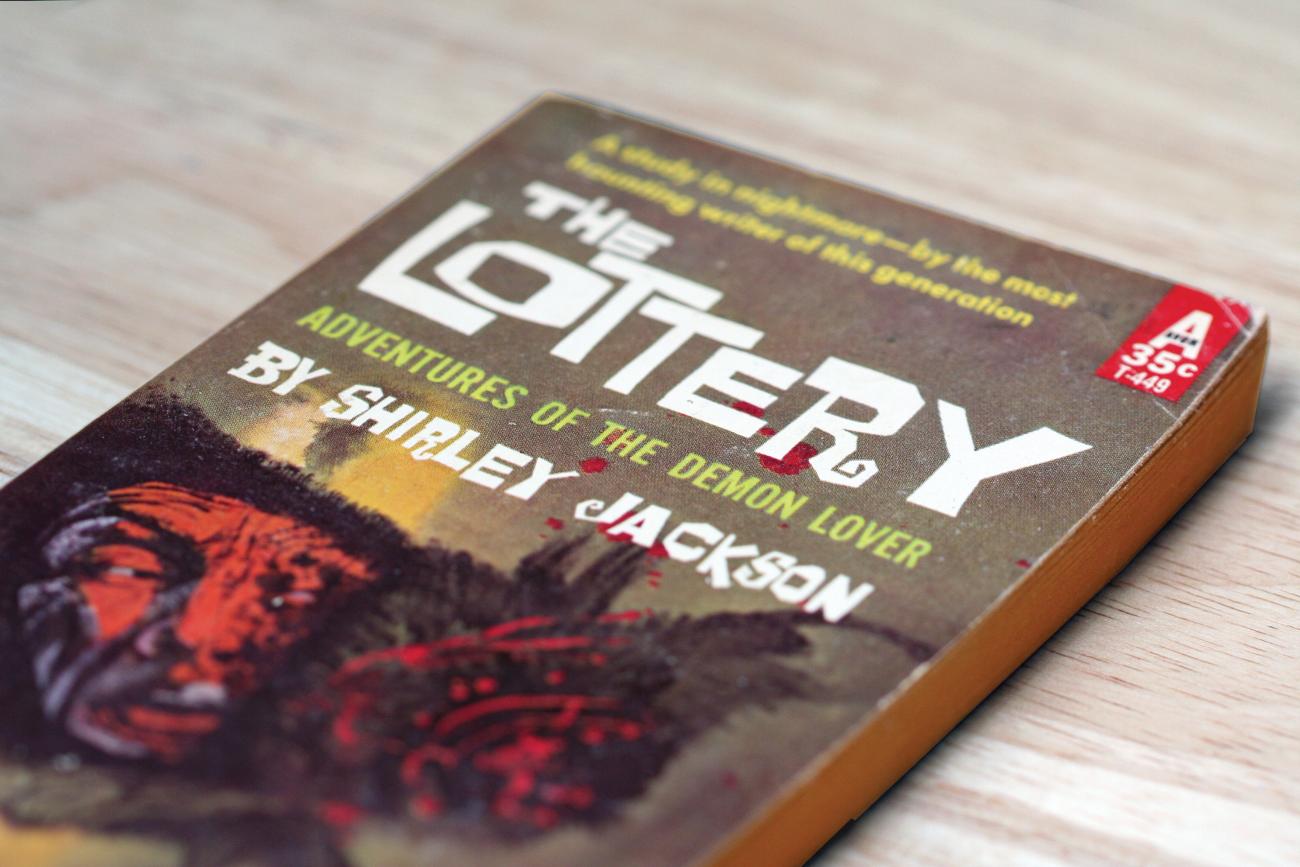"Garbo Talks!"
No two words on a theater marquee were more famous than those used for the 1930 film Anna Christie, the first talkie to feature Greta Garbo.
In 1960, devotees of fiction with a touch of terror might have exclaimed something similar: “Jackson Recites!” That year, Shirley Jackson—whose six novels include the spine-tinglers The Haunting of Hill House (1959) and We Have Always Lived in the Castle (1962)—lent her voice, for the first and only time, to an audio recording. The native of San Francisco—who would die five years later at the age of 48—also penned numerous short stories and essays, including a pair of narratives centered on home life, Life Among the Savages (1953) and Raising Demons (1957).
A release of Folkways Records, The Daemon Lover and The Lottery as Read by Shirley Jackson was just that: a recording of two masterfully macabre short stories as recited by the woman who wrote them. The latter, which first saw publication in the June 26, 1948, issue of the New Yorker, is studied and speculated about like few stories in American literature—a spare, sinewy, blow-by-blow account of a rural community that uses a lottery to select a citizen to kill each summer.
To be sure, Jackson was not exactly a star on the order of Garbo, but she did have in common with the screen legend a proclivity for privacy. In fact, the Folkways release represented a rare foray for Jackson into the realm of mass media. According to Ruth Franklin’s 2016 biography, Shirley Jackson: A Rather Haunted Life, the Folkways release stands as “the only recording of her voice that still exists.”
Franklin reports that Jackson decided against making the record in New York. Instead, she turned to the eldest of her four children with scholar Stanley Edgar Hyman to set up a session at Bennington College in Vermont (where Hyman was a professor). “Jackson, nervous, brought along a glass of bourbon,” Franklin writes. “The clink of ice cubes in her glass is occasionally audible.”
Perhaps it would have been too effusive to proclaim “Jackson Recites!,” but the privilege of hearing a major writer read his or her own words shouldn’t be taken for granted. Imagine if we could listen to authors of decades (and centuries) gone by read their greatest creations—if we could hear, say, Mark Twain give life to Tom Sawyer, Huck Finn, and Becky Thatcher.
Artifacts like The Daemon Lover and The Lottery as Read by Shirley Jackson, then, are to be treasured, especially for the insight they can offer into the writer’s work. Jackson’s vocal nuances—her tone, her timbre—lay bare her ideas about a scene, a moment, or a character. At the time of the record’s release, the publication Billboard praised her performance. “Shirley Jackson does a superb job of reading her two most famous stories, ‘The Lottery’ and ‘The Daemon Lover,’” the review noted. “She reads them with feeling and gets across their strange, and diabolical message.” Yet the description fails to capture Jackson’s understated, almost dissipated delivery. “She reads the story calmly, almost without expression,” Franklin writes in her biography, adding that “a sharpness enters her tone” when reading the dialog of the lottery’s latest victim, a woman named Tessie Hutchinson.
For the most part, however, Jackson projects an air of unruffled detachment, declining to savor the words and phrases—“the lottery,” “the pile of stones,” “the black wooden box”—that hint at the ritual described in the story. As Franklin suggests, Jackson is most expressive when reading dialog, such as the line given to the man tasked with overseeing the lottery, Mr. Summers: “Some of you fellows want to give me a hand?”
Not surprisingly, Jackson-the-reader is in tune with Jackson-the-writer: Both prefer to allow sinister implications to emerge gradually. As the story opens, Jackson digresses to describe the day on which the village holds the lottery—“the flowers were blossoming profusely and the grass was richly green”—and the tentative freedom experienced by the village’s schoolchildren as they embark on their vacations. “They tended to gather together quietly for a while before they broke into boisterous play,” Jackson writes, displaying the perception of a mother of four, “and their talk was still of the classroom and the teacher, of books and reprimands.”
Into this sylvan setting, Jackson inserts perplexing details. For example, the newly liberated schoolchildren select stones to place in their pockets; some make a point of picking out “the smoothest and roundest stones” to carry with them. Most first-time readers are likely to wonder: What is the point of this activity? Are the youngsters planning to skip stones across a lake or partake in an afternoon of hooliganism—smashing glass windows, maybe?
A cloak-and-dagger approach also governs Jackson’s reportage of the lottery itself. We know that most of the village has congregated in a square—“between the post office and the bank”—to pluck slips of paper, one of which is stained with a black spot. It is only when members of the crowd are summoned—“heads of families first,” Mr. Summers commands—that it may dawn on readers that the lottery’s participants do not dream of winning it but surviving it. With a touch of optimism, one villager comments: “Some places have already quit lotteries.” Not this one, though, and not on this otherwise splendid summer day.
Although the black-spotted slip is first selected by Bill Hutchinson, Jackson does not end the story with his demise. In a twist that adds considerably to the richness of the story, it is revealed that the lottery is a two-part affair. This go-around, however, its participants are confined to the Hutchinson family: Bill; his wife, Tessie; and their offspring, Bill Jr., Nancy, and Dave. “Mr. Graves had selected the five slips and put them in the box,” Jackson writes, “and he dropped all the papers but those onto the ground, where the breeze caught them and lifted them off.” Paradoxically, Jackson raises the stakes by narrowing them: It is not easy to sympathize with an entire faceless village, but easy to imagine the pain of a family torn asunder. The Hutchinsons will not leave the lottery intact.
On the Folkways record, Jackson lets loose when reaching the denouement, when Tessie is revealed to be the holder of the black-spotted slip and, moments later, is subjected to a village-wide stoning. On the record, Jackson reads the still-staggering final line with particular force:
“It isn’t fair, it isn’t right,” Mrs. Hutchinson screamed, and then they were upon her.
Jackson articulates the perfectly placed comma between “Mrs. Hutchinson screamed” and “and then they were upon her” with a flawlessly timed pause. The assault on Tessie proceeds so swiftly that the full stop of a period is unnecessary.
In a speech reprinted in the Library of America’s edition of Jackson’s works—Shirley Jackson: Novels and Stories—the author recalled the mail that followed in the wake of the publication of “The Lottery.” “Curiously, there are three main themes which dominate the letters of that first summer—three themes which might be identified as bewilderment, speculation, and plain old-fashioned abuse,” Jackson said, going on to quote letters from correspondents in Kansas (“Will you please tell me the locale and the year of the custom?”), California (“Is it just a story? Why was it published? Is it a parable? Have you received other letters asking for some explanation?”), and Massachusetts (“The ending of this story came as quite a jolt to my wife and, as a matter of fact, she was very upset by the whole thing for a day or two after”). Summarizing the situation, Franklin notes: “More than anything else, they wanted to understand what the story meant.”
According to Franklin, a friend of Jackson said that the author considered the story to be about anti-Semitism, while her daughter, Joanne, said that her mother claimed “it drew from her first experience living in New England.” When revisiting the story, however, its most startling aspect may be its depiction of a family under siege. The lottery turns not only citizen against citizen, but husband against wife, son against mother. Strikingly, Tessie’s husband is left to dislodge the slip from her hand, while her little boy is invited to partake in the stoning with “a few pebbles.” Jackson’s target is any political system that places the needs—or the madness—of a wider community ahead of the family. It is easy to imagine her agreeing with British Prime Minister Margaret Thatcher, who once said: “There is no such thing as society. There are individual men and women, and there are families.”
Here, perhaps, is a clue to those who scratch their heads at Jackson hopscotching between stories like “The Lottery” and such docile divertissements as Life Among the Savages, which writer Elizabeth Frank, reviewing an earlier Jackson biography in the New York Times, aptly described as “a mid-50’s celebration of marriage and family, as sunny and warm as her novels were sinister and dark.” Yet it is no contradiction to simultaneously value family life and to be fearful of its imperilment.
In fact, her reputation as a purveyor of thrills and chills notwithstanding, Jackson was arguably most effective in crafting insidious, slow-to-develop stories that acquired menacing or mystifying dimensions incrementally. To be sure, Jackson contributed to a somewhat-caricatured public image; the biographical sketch accompanying her first novel (1948’s The Road Through the Wall) famously pronounced her as “perhaps the only contemporary writer who is a practicing amateur witch.” In this, she was hitching her wagon to a midcentury vogue for all things spooky, exemplified in the enthusiasm for Charles Addams’s “Addams Family” cartoons, Robert Graves’s The White Goddess, and television personality Vampira. And Jackson could “jolt” the reader with the best of them (as one of her “Lottery” correspondents could attest). In an especially hair-raising passage in The Haunting of Hill House, Eleanor—one of the guests at the ghost-plagued house—sits in a “brutally cold and thickly dark” room while overhearing the wails of a small child. In a state of speechless fear, Eleanor holds onto the hand of her fellow guest, Theodora—“holding so tight she could feel the fine bones of Theodora’s fingers”—but when the light returns to the room, Theodora is revealed to be in a different position than Eleanor had thought. Jackson writes:
“Good God,” Eleanor said, flinging herself out of bed and across the room to stand shuddering in a corner, “Good God—whose hand was I holding?”
The subtle realism on display in “The Lottery” is characteristic of the 24 stories that surround it in the masterful 1949 collection The Lottery or, The Adventures of James Harris. (The subtitle refers to a malevolent, shape-shifting man who snakes through several tales but is always known as James Harris—a reference to a children’s ballad.)
Jackson’s technique more closely resembles a spider weaving a web in the corner of a room than a bogeyman standing at the foot of a bed. In a 2004 introduction to a new edition of the collection (now with the less descriptive title, The Lottery and Other Stories), writer A. M. Homes describes the stories’ elusive, evocative mood: “Everything is thrown into relief, lit in a Hopperesque late-afternoon glow, the one-sided illumination both revealing and casting a long shadow.”
In “The Daemon Lover,” James Harris is spoken of and asked about but never seen nor heard. Having wooed a single 34-year-old woman, Harris disappears from view on the day they are supposed to be married. Jackson stays with the bride as her state of mind shifts from anxiety to panic. On the morning of the nuptials, she frets over her constitution—“I’ll have a headache if I don’t get some solid food soon, she thought, all this coffee, smoking too much, no real breakfast”—and ponders her choice of attire. “The print dress was overly pretty, and new to Jamie,” Jackson writes, using an entirely unbecoming nickname for Harris, “and yet wearing such a print this early in the year was certainly rushing the season.” As morning turns into midday, Harris remains absent, and the protagonist sets out on a long march to find him, waylaying a delicatessen proprietor, a newsstand vendor, and the residents of the apartment complex that Harris supposedly calls home. “He’s rather tall, and fair,” she insists. “He wears a blue suit very often. He’s a writer.”
Those whom the bride accosts are amused by, and disbelieving of, her predicament—a fact she is aware of when she considers, and decides against, reporting Harris as a missing person. “She had a quick picture of herself standing in a police station, saying, ‘Yes, we were going to be married today, but he didn’t come,’” Jackson writes. Yet the story’s faintly comic trajectory—after all, a woman scurrying after a phantom bridegroom could be the stuff of a Howard Hawks comedy—gives way to something darker. At the end of the story, the bride finds herself haunting a derelict apartment house that Harris is said to have entered. Behind one door is a rat-infested bare room, and behind another is the hum of voices and laughter. “She came back many times, every day for the first week,” Jackson writes, in a finish as haunting as “The Lottery.” “She came on her way to work, in the mornings; in the evenings, on her way to dinner alone, but no matter how often or how firmly she knocked, no one ever came to the door.”
“The Lottery” and “The Daemon Lover” both upend comforting assumptions about family life. In the former, we are shocked to find a woman’s husband and child taking part in her persecution, and in the latter we are startled to find a woman, whose sole sin is naivete, left at the altar by a demon of a bridegroom who seems to exist for no purpose but to inspire torment.
An equally disturbing iteration of James Harris turns up in “Like Mother Used to Make,” which presents home as a space inevitably violated and trampled on. David Turner beams with pride over his cozy, well-ordered apartment—it always appeared “warm and friendly and good”—but his significant other, Marcia, has no such standards when it comes to her own apartment. One evening, when David prepares dinner for Marcia, Jackson draws a contrast between the care he has taken and her rapacious appetite. “Marcia was always hungry,” Jackson writes. “She put meat and potatoes and salad on her plate without admiring the serving silver, and she started to eat enthusiastically.” The demon Harris appears in the form of Marcia’s coworker; he intends to call on Marcia at her apartment but instead is invited to David’s. As his two guests gabble and gobble, David becomes a stranger in his own residence. “His clean house, his nice silver, were not meant as vehicles for the kind of fatuous banter Marcia and Mr. Harris were playing at together,” Jackson writes.
The impression is given that David’s apartment is Marcia’s, leading to a truly bizarre moment when David departs as though he is going home—he is, of course, already home—and leaves his residence to a twosome who have begun to resemble the pod people in Invasion of the Body Snatchers. In fact, David proceeds to Marcia’s apartment, described by Jackson with a rare degree of disgust: “It was cold, it was dirty, and as he thought miserably of his own warm home he heard faintly down the hall the sound of laughter and the scrape of a chair being moved.”
Jackson is fascinated with the virtue of forbearance—how much weirdness can her good, decent characters stand before reaching a breaking point? When will the village in “The Lottery”cease its annual summer sacrifices? How long will it take for the bride in “The Daemon Lover” to stop pining for her missing beau?
The Lottery or, The Adventures of James Harris opens with a story that fans of Jackson might be tempted to take as a self-portrait. In “The Intoxicated,” an inebriated party guest ambles into the kitchen of his hosts, where he strikes up a conversation with their 17-year-old daughter, Eileen, toiling on a paper concerning “the future of the world.” She has obviously given the idea some thought, as she proceeds to paint a picture of a future dystopia:
Somehow I think of the churches as going first, before even the Empire State building. And then all the big apartment houses by the river, slipping down slowly into the water with the people inside. And the schools, in the middle of Latin class, maybe, while we’re reading Caesar.
Yet Eileen sees possibility in her doomsday scenario. “You’ll be able to pick up all the candy bars you want, and magazines and lipsticks and artificial flowers from the five-and-ten, and dresses lying in the streets from all the big stores,” she says, and in her energy—her enthusiasm, even—Eileen resembles a teenage version of Jackson, a fabulist of a more sophisticated sort who dreamt up her own horror show.
At the end of “The Intoxicated,” Eileen’s canny intelligence is shrugged off with an aw-shucks line about “kids nowadays,” but—52 years after her death—Jackson’s legacy stands no chance of being so blithely dismissed. Each of her novels remains in print, and the last three years have seen the publication of a fascinating book of uncollected writings. And “The Lottery”? It is still as talked about as ever—but if you want to better understand its subtle spookiness, give a listen to that Folkways record.






